
A lottery is a type of gambling in which lots are purchased and one or more winners are selected by chance. The prize for winning the lottery is usually money or goods. Lotteries can be state-run or privately run. They may be used to distribute income tax refunds, allocate public housing units or select students for a particular school. A lottery can also be a contest in which people try to guess the winning combination of numbers. Regardless of the size of the prize, all participants in a lottery have a low chance of winning. Finding true love and getting struck by lightning are far more likely than winning the lottery.
Lottery is a popular form of gambling, and it has long been a way for governments to raise revenue for public works. The first recorded lottery took place during the Han dynasty in China between 205 and 187 BC. It was called the keno slip lottery, and it helped to finance major government projects. Since the early colonial period, lotteries have been a popular way to fund everything from bridges and roads to public buildings and even wars. George Washington used a lottery to pay for the construction of the Mountain Road in Virginia, and Benjamin Franklin ran a lottery to help finance the building of cannons during the Revolutionary War.
The biggest lottery prize was offered for a horse in the Kentucky Derby in 1875, when a single ticket won more than $1 million. Today, the lottery is a multi-billion-dollar business. Many governments regulate the game to ensure fair play and protect players from fraud. Many people have the instinct to gamble, but it’s important to know when your gut feeling is wrong. The truth is that no amount of luck or paranormal intervention can guarantee victory in a lottery. You have to use a rational and mathematical approach to the game to increase your chances of winning.
There are some basic rules to playing the lottery that you need to keep in mind. First, make sure that you buy a ticket for the correct drawing date. This is particularly important if you’re betting on the Powerball or Mega Millions. If the jackpot isn’t large enough to draw attention on newscasts and online, it won’t sell very well.
Another thing to keep in mind is that no single set of numbers is luckier than any other. It’s impossible to predict the winning numbers, so any set is just as likely as the others to come up. You can increase your odds of winning by buying more tickets.
In addition, it’s a good idea to study the results of previous lottery games to see how frequently each number is drawn. You can also experiment with scratch-off lottery games, looking for patterns in the “random” outside digits that appear on the ticket. Singletons, which appear only once, are more likely to be the winning numbers. When you have a good understanding of how the numbers are distributed, you can choose combinations with a high success-to-failure ratio.